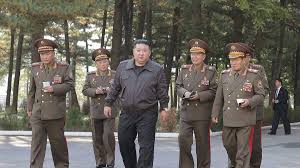North Korea has already deployed soldiers to join with Russia in Ukraine, South Korea’s intelligence agency said. While its government suggests a ‘serious threat to security.’
The accusation was made a day after Ukrainian President Zelensky stated he was concerned. That up to 10,000 North Korean soldiers could be added to the conflict using intelligence data.
Yoon Suk Yeol on Friday held a security meeting with South Korean leaders and pronounced global reaction. To the heinous act saying it should come with “all means available”.
The spy agency says that there are already 1,500 troops in Russia – the South Korean media. With unidentified sources put this figure at 12,000.

It comes at a time as there is growing indication that North Korea is providing. Russia with ammo as illustrated when a missile was discovered in Ukraine’s Poltava area.
Moscow and Pyongyang have also increased cooperation between them over the past few months. The last week Korean Central Television billed Russian President Vladimir Putin as Kim Jong Un’s “closest comrade,”. Who received a birthday message from Kim Jong Un.
Yoon’s office said that Friday’s security meeting included representatives from South Korea’s National . Security Office, the Ministry of National Defence, and the National Intelligence Service.
Context of the Deployment
The decision by North Korea to send troops comes amidst increasing isolation from the international community. And heightened tensions surrounding its nuclear program. The relationship between North Korea and Russia has traditionally been one of convenience, with both nations. Often finding common ground in their opposition to U.S. influence in the region. However, this military cooperation signals a deeper alliance as both countries face mounting pressure from Western sanctions and diplomatic isolation.

Motivations Behind the Move
Several factors may have influenced North Korea’s decision to send troops:
- Strategic Alliance: Strengthening ties with Russia may provide North Korea. With a buffer against perceived threats from the U.S. and its allies, while also showcasing. Its military capabilities on a global stage.
- Economic Support: North Korea is grappling with severe economic challenges exacerbated by international sanctions. Aligning with Russia could lead to economic benefits, including potential military aid or resources.
- Domestic Propaganda: The North Korean regime often utilizes external conflicts to rally domestic support. By participating in the conflict alongside Russia, it can frame its actions as a defense of socialism against Western aggression.
Regional Reactions
The response from neighboring countries, particularly South Korea, Japan, and China, has been one of heightened concern. South Korean officials have expressed alarm over the potential for increased military. Collaboration between Pyongyang and Moscow, which could lead to a more aggressive North Korean posture in the region.
Japan’s government is closely monitoring the situation, fearing that North Korean troops in Russia could embolden. Pyongyang’s military actions, including missile tests or provocations against Japan.
China, while maintaining a strategic partnership with both countries, is likely to approach this development with caution. Beijing may be concerned about the stability of the Korean Peninsula and the potential. For escalating tensions that could disrupt its own security interests.

Implications for International Relations
North Korea’s military support for Russia could have broader implications for international relations:
- Strengthened Axis: A deeper military alliance between North Korea and Russia could signal. A shift in the balance of power, challenging U.S. dominance in East Asia.
- Increased Tensions: This development could lead to increased military readiness and potential. Arms races in the region, as nations bolster their defenses in response.
- Diplomatic Stalemate: The deployment may further complicate efforts for denuclearization and peace talks on the Korean Peninsula, as North Korea becomes more entrenched in its alliances.
Conclusion
North Korea’s decision to send troops to support Russia is a significant development that could reshape the geopolitical dynamics in East Asia. As the situation unfolds, the international community will need to carefully navigate the complexities of this new alliance, while working to maintain stability in a region already fraught with tension. The coming months will be critical in determining the long-term implications of this military cooperation and its impact on the already delicate security environment in Northeast Asia
Frequently Asked Questions (FAQS)
Why would North Korea send troops to Russia?
Hence, North Korea might offer forces for various purposes – to strengthen political partnership. For training purposes or in exchange with political or financial assistance or weapons or both from Russia to Moscow.
2. What is the historical context of North Korea-Russia relations?
North Korea and Russia had relationships for a long time starting from Korean. War when Soviet Union was supporting North Korea. The two states have continued to stand together especially in their common defiance of American power within the region.
3. How would this impact the geopolitical situation in East Asia?
In the case of North Korea getting involved in a fight with Russia, there are increasing chances. Of conflict in East Asia with the consequent impacts that will cause preparedness. For conflict from both South Korea, Japan and America. It also means that the current power relations within the region can be altered.
4. What is the response from South Korea and its allies?
South Korea, the U.S and other allies would probably watch development of the conflict very closely. And may step up readiness, including live fire, to deter aggression.
5. Could this lead to a larger conflict?
Of course, an activity of North Korea could provoke tension turn into a large scale conflict. However, this would depend on the actions of regional states and diplomatic interventions.